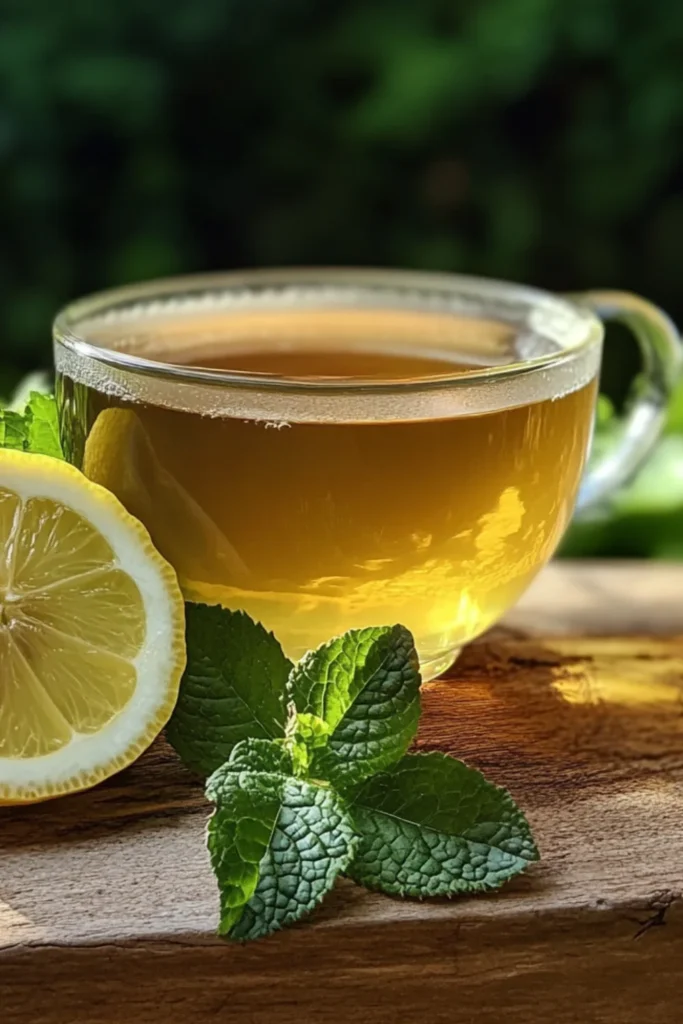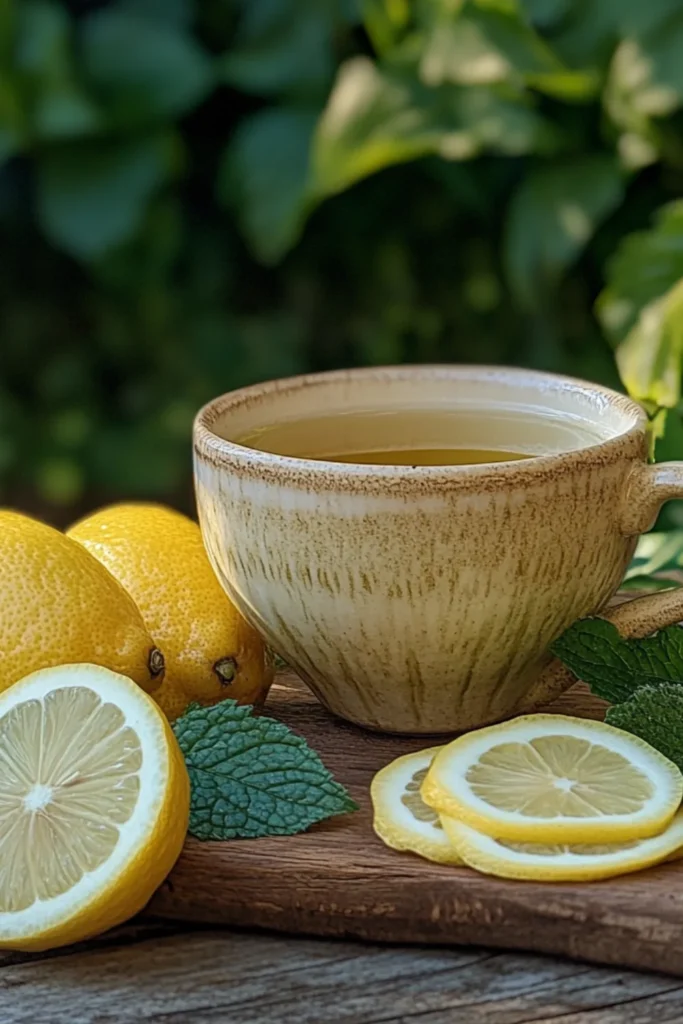Table of Contents
If you’re on a journey to shed a few pounds, you’ve probably heard about countless diets, supplements, and workouts. But have you ever considered turning to nature for a helping hand? Enter lemon balm—a fragrant, lemon-scented herb that’s been used for centuries to promote relaxation, improve digestion, and even support weight loss.
In this article, we’ll explore how lemon balm can become your secret weapon in achieving your weight loss goals. From its rich history and nutritional benefits to simple recipes you can make at home, we’ll cover everything you need to know about this versatile herb. Whether you’re sipping it as a tea, blending it into a smoothie, or using it as a supplement, lemon balm might just be the natural boost your weight loss routine needs.
So, let’s dive in and discover how to harness the power of lemon balm for a healthier, slimmer you!
What Is Lemon Balm?
Overview of Lemon Balm
Lemon balm, scientifically known as Melissa officinalis, is a perennial herb from the mint family. With its bright green leaves and delicate lemon aroma, it’s not just a pretty plant—it’s a powerhouse of health benefits. Native to the Mediterranean region, lemon balm has been used since ancient times for its calming and medicinal properties.

More Like This: Delicious Panda Express Honey Sesame Chicken
Historically, it was a favorite among herbalists and healers. The Greeks and Romans used it to soothe nerves, while medieval Europeans believed it could ward off evil spirits. Today, it’s celebrated for its ability to reduce stress, improve sleep, and even aid in weight loss.
Nutritional Profile of Lemon Balm
What makes lemon balm so special? It’s packed with beneficial compounds like antioxidants, polyphenols, and rosmarinic acid. These nutrients not only fight inflammation but also support overall health. Additionally, lemon balm contains trace amounts of vitamins and minerals, such as vitamin C and magnesium, which play a role in metabolism and energy production.
Benefits of Lemon Balm for Weight Loss
Key Benefits of Lemon Balm
Reduces Stress and Emotional Eating
Let’s face it—stress is a major roadblock when it comes to weight loss. When you’re stressed, your body produces cortisol, a hormone that can lead to cravings for sugary, fatty foods. Lemon balm has been shown to calm the nervous system, reducing stress and anxiety. By helping you feel more relaxed, it can curb emotional eating and make it easier to stick to your diet.
Improves Digestion
A healthy gut is essential for weight loss, and lemon balm can play a key role here. This herb has been used for centuries to soothe digestive issues like bloating, gas, and indigestion. By improving digestion, lemon balm ensures that your body efficiently processes nutrients and eliminates waste, which can help you feel lighter and more energized.
Boosts Metabolism
Your metabolism is like your body’s engine—it determines how quickly you burn calories. Some studies suggest that lemon balm may help boost metabolism by supporting thyroid function and improving energy levels. While it’s not a magic bullet, incorporating lemon balm into your routine could give your metabolism a gentle nudge in the right direction.
Suppresses Appetite
If you’re constantly battling hunger pangs, lemon balm might be your new best friend. Its natural compounds can help regulate appetite, making it easier to resist unhealthy snacks. Drinking lemon balm tea before meals, for example, can create a feeling of fullness, helping you eat less without feeling deprived.
Additional Health Benefits of Lemon Balm
Anti-Inflammatory Properties
Inflammation is often linked to weight gain and difficulty losing weight. Lemon balm contains powerful anti-inflammatory compounds that can help reduce inflammation in the body. This not only supports weight loss but also promotes overall health.
Improves Sleep Quality
Did you know that poor sleep can sabotage your weight loss efforts? Lack of sleep disrupts hormones that control hunger and appetite, leading to overeating. Lemon balm is known for its calming effects, which can help you fall asleep faster and enjoy deeper, more restorative sleep.
How to Make Lemon Balm for Weight Loss
Preparing Lemon Balm at Home
Growing and Harvesting Lemon Balm
If you’re a fan of fresh herbs, why not grow your own lemon balm? It’s surprisingly easy to cultivate, even for beginners. Here’s how to get started:
- Planting: Choose a sunny spot with well-draining soil. Lemon balm thrives in gardens or pots.
- Watering: Keep the soil moist but not waterlogged.
- Harvesting: Pick the leaves in the morning when their essential oils are most potent.
Once harvested, you can use the leaves fresh or dry them for later use. To dry lemon balm, simply hang the stems upside down in a cool, dark place for about two weeks.
Lemon Balm Recipes for Weight Loss
Lemon Balm Tea
Lemon balm tea is one of the simplest and most effective ways to enjoy this herb for weight loss. Here’s how to make it:
- Ingredients:
- 1 tablespoon fresh or dried lemon balm leaves
- 1 cup boiling water
- Optional: honey or lemon for flavor
- Instructions:
- Place the lemon balm leaves in a cup.
- Pour boiling water over the leaves.
- Let it steep for 5-10 minutes.
- Strain and enjoy!
For an extra boost, try adding a slice of ginger or a dash of cinnamon.
Lemon Balm Infused Water
If you’re looking for a refreshing way to stay hydrated, lemon balm infused water is a great option.
- Ingredients:
- A handful of fresh lemon balm leaves
- 1 liter of water
- Optional: cucumber slices or mint leaves
- Instructions:
- Add the lemon balm leaves (and optional ingredients) to a pitcher of water.
- Let it infuse in the fridge for at least 2 hours.
- Serve chilled.
Lemon Balm Smoothies
Adding lemon balm to your smoothies is a delicious way to reap its benefits.
- Ingredients:
- 1 cup fresh lemon balm leaves
- 1 banana
- 1/2 cup Greek yogurt
- 1/2 cup almond milk
- 1 tablespoon honey
- Instructions:
- Blend all ingredients until smooth.
- Pour into a glass and enjoy!
Lemon Balm Capsules or Tinctures
If you’re short on time, lemon balm supplements are a convenient alternative. Capsules and tinctures are widely available, but make sure to choose a reputable brand. Always follow the recommended dosage on the label.

Incorporating Lemon Balm into Your Weight Loss Routine
Daily Usage Tips
Best Time to Consume Lemon Balm
Timing is everything when it comes to maximizing the benefits of lemon balm. Here’s when to enjoy it:
- Morning: Start your day with a cup of lemon balm tea to kickstart digestion and reduce stress.
- Evening: Sip on lemon balm tea before bed to promote relaxation and improve sleep quality.
Dosage Recommendations
While lemon balm is generally safe, moderation is key. Here are some guidelines:
- Tea: 1-2 cups per day.
- Capsules or Tinctures: Follow the manufacturer’s instructions, typically 300-500 mg per day.
- Fresh Leaves: Use a handful of leaves in recipes or infusions.
Combining Lemon Balm with Other Weight Loss Strategies
Pairing with a Balanced Diet
Lemon balm works best when combined with a healthy diet. Focus on whole foods like fruits, vegetables, lean proteins, and whole grains. Avoid processed foods and sugary snacks, which can counteract the benefits of lemon balm.
Exercise and Lemon Balm
Regular exercise is a cornerstone of any weight loss plan. Lemon balm can enhance your workouts by reducing muscle tension and improving recovery. Try drinking lemon balm tea after exercise to soothe your body and mind.
Potential Side Effects and Precautions
Is Lemon Balm Safe for Everyone?
Common Side Effects
While lemon balm is generally safe for most people, it’s important to be aware of potential side effects. Some individuals may experience mild symptoms such as:
- Dizziness
- Nausea
- Headaches
These side effects are rare and usually occur only when lemon balm is consumed in large amounts. If you experience any discomfort, reduce your intake or stop using it altogether.
Who Should Avoid Lemon Balm?
Although lemon balm is a natural remedy, it’s not suitable for everyone. Here are some groups who should exercise caution:
- Pregnant and Nursing Women: There’s limited research on the effects of lemon balm during pregnancy or breastfeeding, so it’s best to avoid it.
- Individuals with Thyroid Conditions: Lemon balm may interfere with thyroid function, so consult your doctor before using it.
- Children: While generally safe, it’s wise to consult a pediatrician before giving lemon balm to children.
Interactions with Medications
Medications to Avoid
Lemon balm can interact with certain medications, potentially reducing their effectiveness or causing adverse effects. Be cautious if you’re taking:
- Sedatives: Lemon balm has calming properties that may enhance the effects of sedative medications.
- Thyroid Medications: It may interfere with thyroid hormone replacement therapy.
- Antiviral Drugs: Lemon balm has antiviral properties that could interact with medications like acyclovir.
Always consult your healthcare provider before adding lemon balm to your routine, especially if you’re on medication.
FAQs About Lemon Balm for Weight Loss
Can lemon balm tea help with weight loss?
Yes, lemon balm tea can support weight loss by reducing stress, improving digestion, and boosting metabolism. However, it’s not a magic solution—pair it with a healthy diet and exercise for best results.
How long does it take to see results?
Results vary depending on your overall lifestyle and consistency. Some people notice improvements in digestion and stress levels within a few weeks, while significant weight loss may take longer.
Can I drink lemon balm tea every day?
Absolutely! Drinking 1-2 cups of lemon balm tea daily is generally safe and beneficial. Just avoid excessive consumption to prevent potential side effects.
Are there any side effects of lemon balm?
While rare, some people may experience mild side effects like dizziness or nausea. Always start with small amounts to see how your body reacts.
Can lemon balm replace a weight loss diet?
No, lemon balm should complement a balanced diet and exercise routine, not replace it. Think of it as a helpful tool in your weight loss journey.




